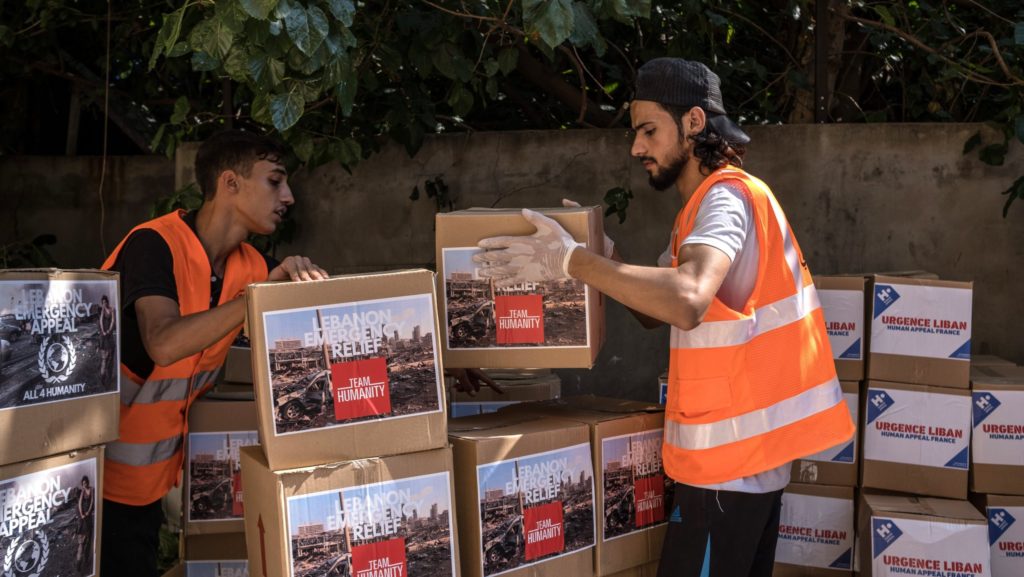A prominent Catholic humanitarian agency in the Middle East has expressed concern over sudden cuts to U.S. financial assistance affecting its ministries aiding the displaced, refugees and the impoverished.
In February, the Trump administration announced it was dismantling the U.S. Agency for International Development by eliminating more than 90% of its foreign aid contracts and $60 billion in overall U.S. development and humanitarian assistance abroad.
This decision has negatively impacted major projects that Catholic organizations share with the United Nations Office of the High Commissioner for Refugees, or UNHCR, and the World Food Program, the world's largest provider of food aid, which receive American funding.
WFP head Cindy McCain warned April 7 the cuts "will deepen hunger, fuel instability, and make the world far less safe," in a post on X.
Father Michel Abboud, the Carmelite president of Caritas Lebanon, called the ending of U.S. humanitarian aid for Syrian refugees and poor Lebanese alarming.
"We are all shocked and surprised. If we had been prepared for such a decision, we could find another source for our projects and necessary budget, but these have been severe decisions," he told OSV News by phone from Beirut.
However, Father Abboud welcomed on April 10 the Trump administration's reinstatement of some recently canceled U.S. foreign aid programs for emergency food assistance provided by the WFP.
"This is good news for us," the Caritas Lebanon president said of the administration's reversal. Earlier, WFP received termination letters for work in Lebanon, Jordan and Syria, among other countries.
With WFP, Caritas Lebanon provides tens of thousands of hot meals, as well as food parcels, to people in Lebanon displaced by conflict and insecurity.
"Working with WFP, we have been providing critical food aid also to many poor Lebanese. If we stop now, how will they be able to find food from another source?" Father Abboud asked.
But the stoppage of U.S. funding to UNHCR is having a dire impact on Caritas work in Lebanon and Jordan. Already, 10% of Caritas Lebanon's budget and work had been curtailed by U.S. cuts to its work with the U.N. refugee agency. Education, legal counseling, primary health care, child protection and psychosocial support are among the services provided, Father Abboud said.
In addition to shrinking vital services, "every project has its staff, and thus it has created unemployment for our workers. This has compounded an already difficult situation," Father Abboud explained.
More than 2,000 people have been affected by cuts impacting the UNHCR partnership with non-governmental organizations, he said.
Some 1.5 million Syrian refugees are registered in Lebanon, a country of 5.7 million, but there are many more sheltering in the tiny Mediterranean country without papers and who need help.
"The decisions taken are creating the 'new poor' in Lebanon because we already have people without work," Father Abboud said. Observers say the presence of large numbers of Syrian refugees for the past 14 years is also straining the already fragile fabric of the society and its economy.
"We continue to face a severe economic crisis, and it seems like crisis after crisis is hitting Lebanon: from the COVID-19 pandemic, the 2020 Beirut port explosion, money blocked in the country's banks and peoples' savings lost, the 2024 conflict with Israel in the south and Hezbollah, and now the ending of U.S. aid. This is not easy for the Lebanese people," he said.
While WFP does not contribute to the work of Caritas in nearby Jordan, UNHCR has played a vital role for many years as Jordan continues to shelter refugees from the region's many conflicts, including those from Syria, Iraq, Sudan, Somalia, Yemen and Libya.
Wael Sulieman, the general director of Caritas Jordan, told OSV News that its UNHCR assistance has been cut by 70%.
"We are still in negotiations with our partners. We will be meeting with UNHCR and then we will know what to do," Sulieman said.
"For any of these organizations, it seems like the end of life. But I can assure you that after 25 years of working for Caritas, we have passed through difficult moments always because this is part of the life of any NGO (nongovernmental organization)," he said.
"Anybody can close a door. But I can tell you a secret: God can open 100 doors afterwards. Some people may not consider this professional. But it is professional because we are a humanitarian organization. The organization is not depending only on donors, on people, but also on God. We believe in God. We are a Catholic organization. I saw miracles take place during all these years," Suleiman affirmed.
The Caritas Jordan chief admitted that the current circumstances are difficult and challenging -- not because of Caritas or the staff, he said, but because of "the beneficiaries," due to the lack of badly needed funding.
"This is something that hurts us," Sulieman said. "But nevertheless, we believe that we can find a solution as Caritas is depending only on God."

